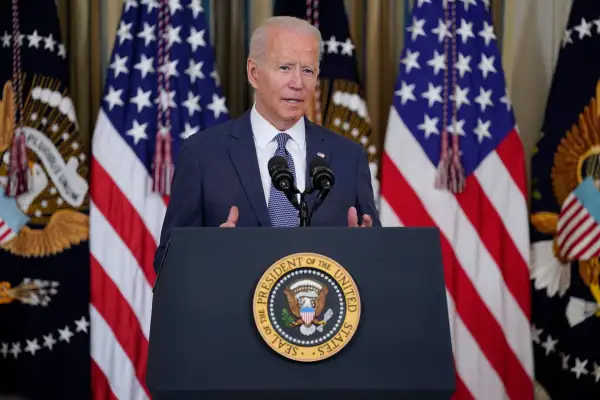President Biden's New Executive Order Could Save You Money on Airfare, Medications and More

President Joe Biden has signed a sweeping executive order today aimed at increasing competition in the economy, with the ultimate goal of raising wages for workers and lowering prices for consumers.
The Biden administration says that corporate consolidation and anti-competitive practices have allowed large companies to drive up prices, made it harder for employees to ask for better pay and limited economic growth. Altogether, that costs the typical American household $5,000 a year, according to research highlighted in a White House fact sheet released Friday.
With the executive order, Biden is also pushing federal regulators to create new rules addressing issues in healthcare, airline and internet service pricing.
Much is still unknown about how federal agencies will carry out the administration's requests, how effective any new rules may be, and when consumers may start to see changes. But the order does include the creation of a White House Competition Council that is tasked with monitoring the progress of carrying out the administration’s goals.
Overall, the executive order introduces 72 initiatives in areas as wide-ranging as the cost of hearing aids, maritime shipping fees and antitrust laws. Here are 5 key clauses that could directly affect your wallet.
Clearer fees and more refunds from airlines
The White House says that lack of competition allows airlines to offer substandard service. In response, the Department of Transportation is tasked with drafting clear rules that would require airlines to refund customers' money when they lose bags or when in-flight services, like Wi-Fi, don't work. The order also calls for more upfront disclosure around common airline fees, so that consumers can more easily see the cost for baggage, flight changes or cancellations at the time when they're booking a flight.
Fewer non-compete agreements
The executive order encourages the Federal Trade Commission to ban or limit non-compete agreements — employee contracts that limit where you can work after you leave a job, sometimes for more than a year. Critics say make the agreements make it harder for workers to switch jobs for better pay or working conditions.
Research from the left-leaning Economic Policy Institute shows that tens of millions of workers in industries like construction and hospitality are required to sign non-compete agreements when they get hired. In fact, roughly half of all private-sector businesses require at least some of their employees to sign such agreements, and a third of businesses require all employees to do so, regardless of their job title or responsibilities.
"Workers should be free to take a better job if someone offers it," Biden said in his address ahead of signing the order.
Lower prescription drug prices
The order also includes a few directives aimed at reducing prescription drug prices, which continue to climb faster than inflation. Research from the RAND Corporation shows that Americans pay 2.5 times as much for prescription drugs as residents in similar countries, and a poll from the Kaiser Family Foundation found that nearly one in four Americans say they have difficulties paying for prescription medication.
Researchers say the pervasiveness of brand-name prescription drugs are one of the drivers of America's unaffordable medication prices. As a result, the administration wants the Health and Human Services Administration to increase support for developing more low-cost generic drugs, and it wants the FTC to ban what's known as "pay for delay" agreements, through which brand-name drug developers pay generic drug developers to stay out of the market. The order also supports states importing drugs from Canada.
Better transparency in internet billing
Through the executive order, the White House is seeking to help save Americans money on their internet bills by reviving plans for an Obama-era "Broadband Nutrition Label." The disclosure, which outlines basic information about the cost of internet services, would add transparency for people shopping for a provider.
The order also pushes the FTC to crack down on pricey early termination fees, which the administration says limits competition by blocking consumers from switching to lower-cost options.
Increased enforcement in healthcare, tech and agriculture
Finally, the executive order repeatedly pushes for stronger enforcement from several federal regulators, specifically when it comes to reviewing company mergers. There are clauses aimed at requiring hospitals to be more transparent about billing, increasing federal scrutiny of how big tech companies use consumer data, and issuing rules that would help farmers combat abusive practices by large meat processing companies.
More from Money:
You Don’t Have to Be a Billionaire to Go to Space
6 Expert Tips for Navigating the New Monthly Child Tax Credit
How to Give Money to Family Members Without Making it Awkward
